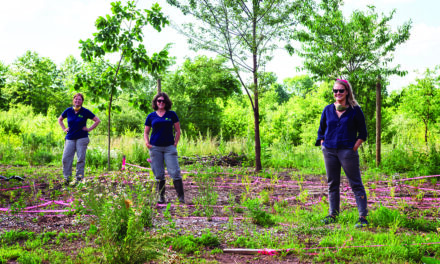As Air Force Commander of the 305th Operations Support Squadron at McGuire Air Force Base, Lt. Col. Jannell MacAulay focused on mindfulness and compassion. She handed the baton to Lt. Col. Michele Lobianco, who brought her own style, dialing in on self-actualization and love for her airmen. Using their own distinctive approaches, they are changing the face and the meaning of a commander. And military leadership may never be the same.
Real Woman Revealed Podcast
Part 1: Becoming Mindful
Whether she’s in her forest-green flight suit or dress blues, Lt. Col. Jannell MacAulay walks with perfect posture and poise, and she holds her head and shoulders like a commander should, due as much to her yoga training as her outlook on life. She’s slight in stature, has a warm, easy smile, and she chooses her words with careful precision. With both academic and military résumés loaded with impressive degrees, distinctions, and experiences, most of her achievements happened exactly according to plan. When she was a little girl growing up in Irvine, Calif., MacAulay’s father told anyone who would listen that his daughter was going to be a fighter pilot or submarine commander when she grew up. And that was in the 1980s, before women were allowed to serve in those roles.
But MacAulay is intellectually curious and has an insatiable spirit, so she took her Dad’s you-can-be-anything-you-want attitude to heart. “I’m always going to throw my hat in the ring and see where it lands,” MacAulay says.
She graduated from the Air Force Academy in 1998 and had the option to attend Euro-NATO Joint Jet Pilot Training to become a fighter pilot, which she delayed so she could get a master’s degree from Penn State in exercise physiology. Degree in hand, she did her pilot training in Oklahoma, after she married fellow Air Force Academy graduate (and now colonel) Christopher MacAulay. She decided to be a mobility pilot to fly heavy planes, which would allow for the kind of life she wanted—one that involved traveling the world and raising a family. The next thing she knew, MacAulay was 24 years old and living in Germany, transporting distinguished visitors in the C-21 Learjet. “Every day was something new in a different location. One day, you might be having lunch in Venice. Then the next day, you’re in Rome or in Africa.”
Her career in the military soared—she accumulated more than 3,000 flying hours in the C-21, C-130, and KC-10. But 8 years ago, as MacAulay was in the middle of training pilots, engineers, and boom operators to become aviators on the KC-10, an advanced tanker and cargo aircraft, the pressure began to build. Her husband was deployed in the Middle East for a year, and she was temporarily a single parent to their then 2-year-old daughter, Ally Rose. “I wanted to be everything for everybody because I was the leader,” says MacAulay. “But through the course of that year, I had a complete and utter physical and emotional burnout. At that point I realized I needed to take better care of myself—to put my oxygen
mask on before I led or served others.”
So, MacAulay turned back to the academic world, and attended the School of Advanced Air and Space Studies to focus on leadership and strategy. “I realized I had been doing it wrong, and I wanted to find a better way,” MacAulay says. “That’s what led me into my dissertation work, which was focused on performance under stress. I studied how we can each individually perform so that as a team, when we lock arms together, we can be unstoppable, especially in the midst of high stress and in a combat environment.
“I found that it really comes down to the ability to live in the moment,” she says. “As a mom, as a leader, and as a pilot—mindfulness became my solution.”
As she began to dig into the concept of mindfulness, both from an academic and practical standpoint, MacAulay came to the conclusion that many of us misinterpret mindfulness as a way to eliminate stress and achieve work-life balance, which is an unrealistic expectation. Instead, she sees mindfulness as a resource to harmonize her work and life together, by living more in the present moment, and not allowing the stress in her life to overwhelm her. It is also a way to self-reflect. “If you don’t wake up every morning knowing and loving yourself, you’re going to have trouble making decisions for yourself and others,” she explains. “I think a lot of leaders struggle to be confident enough in who they are and to be their authentic selves.”
After she got her PhD in strategy, MacAulay was hired to lead the 400-member 305th Operations Support Squadron at McGuire Air Force Base in Burlington County, N.J. The unit consisted of 10 flights, two airfields, and the largest formal training unit for the KC-10, which is an advanced tanker and cargo aircraft, and MacAulay was determined to apply her degree—plus her knowledge as a pilot, a yoga instructor,
and a mom of two kids—to her new leadership role at the base. She was eager to see how her mindfulness-based approach to leadership would be accepted by her squadron, her peers, and the Air Force.
And that’s when she met Lt. Col. Michele Lobianco.
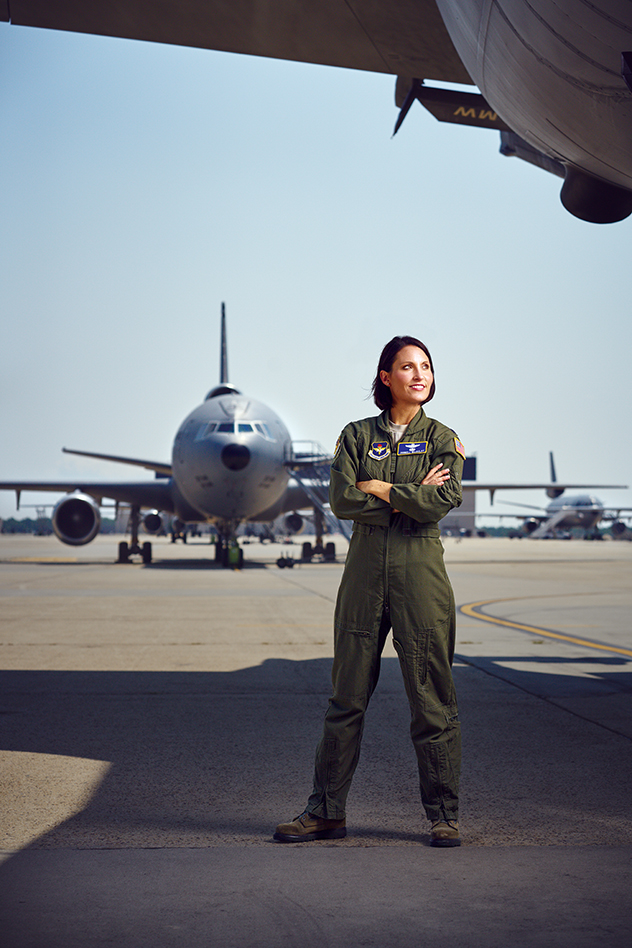
We expect leaders to be perfect. But there’s so much learning and growth within our imperfections. In the military, the fear of failure holds us back. It only requires courage to take those leaps and step outside of our comfort zone.
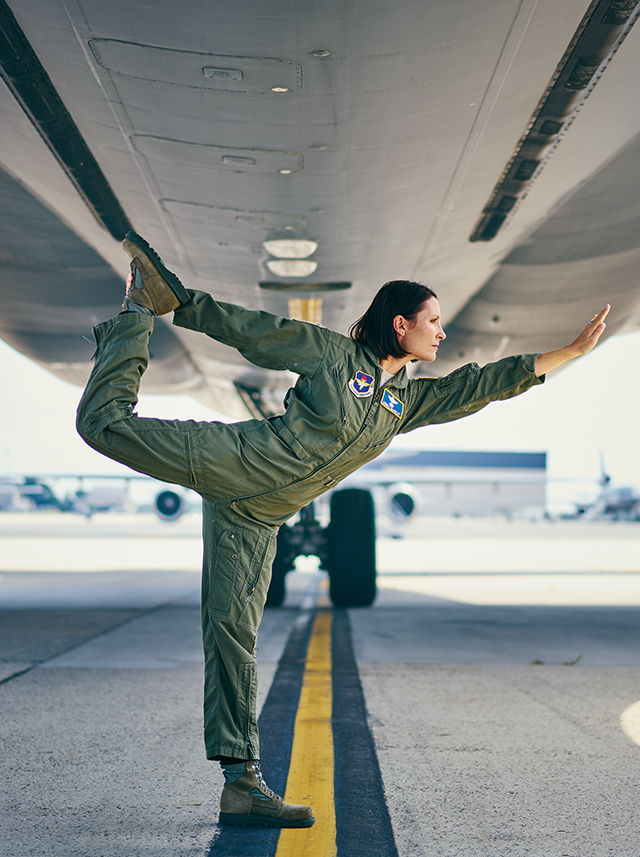
Lt. Col. Jannell MacAulay is the 58th Special Operations Wing’s Director of Human Performance and Leadership at Kirtland Air Force Base in Albuquerque, N.M., and the former commander of the 305th Operations Support Squadron at McGuire.
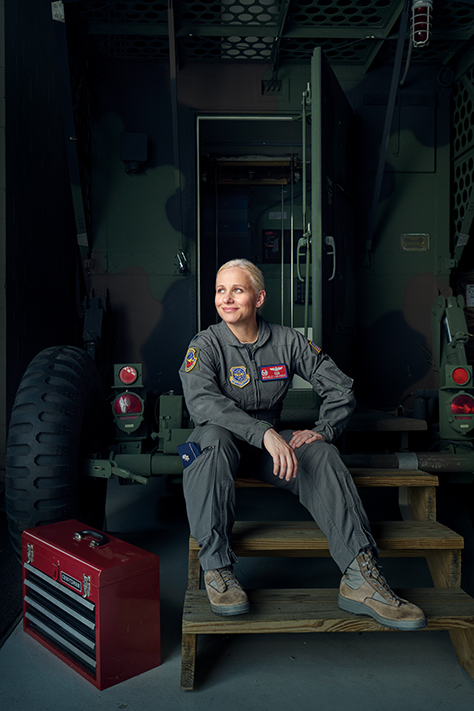
Lt. Col. Jannell MacAulay is the 58th Special Operations Wing’s Director of Human Performance and Leadership at Kirtland Air Force Base in Albuquerque, N.M., and the former commander of the 305th Operations Support Squadron at McGuire.
Vulnerability is a powerful thing. Sharing the story of self is a meaningful action. It helps people see that passion is important, and grit is something that is earned.
Part 2: A Self-Actualized Career
When Lt. Col. Michele Lobianco wakes up every morning and gets to her feet, she is 64 inches tall, which is the required height to be an active-duty pilot in the U.S. Air Force. But nearly two decades ago, she reported for her first day of active duty, which included a physical assessment late in the afternoon. And after years of working and training to become an active-duty pilot, Lobianco came up .02″ short and was disqualified from the role.
It was a crushing turn of events, but she was determined to find another way to become a pilot. Lobianco was still in her early twenties, so she decided to go back to school, studying atmospheric sciences at Ohio State University to become a weather officer in the Air Force. She worked to get her pilot’s license and instructor’s license on the side. “I was relentless, and I had the right people believe in me,” Lobianco says. “My 8th Air Force Commander put me up for the active duty board. Only 50 people in the Air Force get picked up, and I was the only female.”
This opportunity gave her another chance, but she still had to pass the physical. So, at 25, she headed back to that same medical facility where she’d come up short 5 years earlier, hoping she’d be tall enough to pass the test this time. “I walked in for my physical, and the same people were still there. They knew exactly who I was,” Lobianco recalls. “They measured me, and they read it in centimeters. So, I had to run into somebody’s office and calculate it in inches. I had measured over 5’4″, and I called my boss and just cried. I said I did it. He told me, ‘Now there’s no limit for you.’”
While she has a bachelor’s degree in physics and mathematics from the University of Miami, an MAS in strategic intelligence from American Public University, and a master’s degree in public administration from Harvard, it’s Lobianco’s emotional intelligence and grit that sets her apart. “I’ve always been told ‘No’ every step of the way: You’re too short; you’re a woman,” she says. “But my mom said, ‘Don’t reach for the moon; reach for the stars.’ That led me to a life of self-actualization, where I wouldn’t let anything stop me.” As an academic and in-practice expert in self-actualization, which occurs when you maximize your potential, she’s become adept at incorporating the concept into her numerous roles in the Air Force and in helping others become the best versions of themselves.
And that’s when she met Lt. Col. Jannell MacAulay.
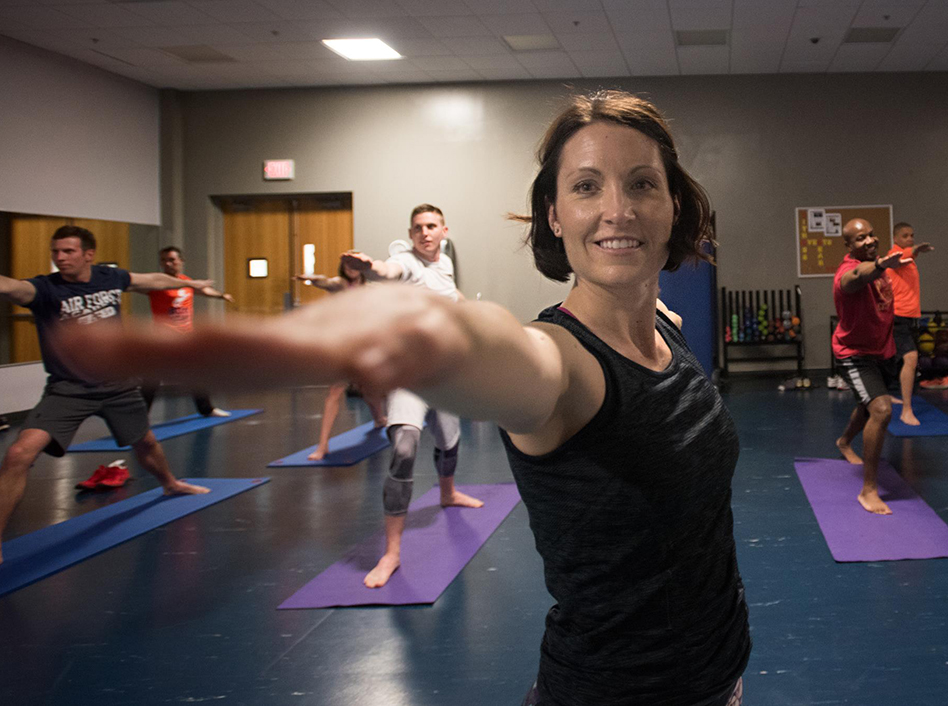
Part 3: A New Approach to Leadership
When Lobianco started as director of operations for the 305th Operations Support Squadron at McGuire Air Force Base, in September of 2015, MacAulay was in her fourth month as commander. She immediately recognized that MacAulay did not have a conventional style of leadership, and the two clicked immediately as co-workers and as friends.
“[MacAulay] had an approach to people that was about finding the best versions of themselves. It was about mindfulness and self-awareness,” Lobianco says. “It was different. I wasn’t used to it, but I definitely embraced it. I don’t want cookie-cutter airmen, and she’s not a cookie-cutter leader. She would say, ‘Maybe we’ll do a little meditation on the side.’ She incorporated yoga. She walked the walk. But she also cared about the airmen as people. And that inspires airmen. It inspired me.”
But whether it was yoga or meditation exercises, the mindful approach to leadership wasn’t for everyone, and it took some time to get everyone on board, Lobianco says. “People are skeptical when something is different. Right away they want to attack it. They think, ‘If her way is the new way, then I am old hat, and I am wrong,’” she says. “So, people were defensive. But I never felt that the airmen weren’t buying into what she was giving them—someone
to tell them it was OK to be different.”
In fact, MacAulay noticed that an increasing number of airmen started attending yoga and meditation sessions and practicing deep breathing and the mindful minute, which MacAulay calls “mental push-ups.” It was mainly the senior enlisted leaders who took the most convincing, she says. “At one point, I asked them if it even mattered that I was trying to lead this way. They said, “Ma’am, we just didn’t know how to take you at first.’ I tried to let them know they mattered and I cared,” she says. “I started by exhibiting the traits of a mindful leader—being present and connecting. Once you connect, you build trust. With trust, they will follow you on the journey.”
In addition to mindfulness, both women believe in the concept of “failing forward,” which focuses on empowering airmen to make decisions without fear of failure. “I ask my squadron all the time, What would you do if you weren’t afraid to fail?,” Lobianco says. “If we don’t empower them to try now and tell them they have to be perfect, when they become commanders, they become so risk-adverse that they can’t make decisions, and they will not see what’s best for their people when they have to make tough calls.”
MacAulay says the perception that leaders should be perfect or that mistakes are a negative reflection on us as individuals leads to problems and missed opportunities to learn and improve: “There’s so much growth that happens within our imperfections. In the military, the fear of failure holds you back. It only requires courage to take those leaps and step outside of our comfort zone.”
In December of 2016, MacAulay moved to Albuquerque, N.M. where her husband, Chris, was stationed, to become the 58th Special Operations Wing’s Director of Human Performance and Leadership at Kirtland Air Force Base. Before she left, she passed command of the 305th to Lobianco, who has two kids and a third on the way. For the most part, their leadership styles complement each other, although MacAulay leans more toward mindfulness, while Lobianco is focused on self-actualization. But both leaders are sure of one crucial ingredient: love. “People have a paycheck and a job and basic survival needs. But feeling safe in your work environment really matters,” MacAulay says. “It drives the military a little crazy, but you have to pass through love and belonging and psychological safety to get to high performance.”
MacAulay used no-email Fridays, wrote personal notes to members of her squadron, called airmen’s loved ones to share details about successes, and focused on being mindful and present with the members of the 305th OSS. “I think they felt loved because I genuinely care about them,” MacAulay says.
The question is, does this kind of leadership, which takes into account the whole person and motivates with care and compassion, actually work? Under the leadership of MacAulay and Lobianco, the 305th OSS was awarded the 2016 OSS of the Year for Air Mobility Command and the 2016 Airfield Complex of the Year for the entire Air Force. “During my tenure as commander, the members of the OSS grew as individuals both personally and professionally, and the organization thrived. I know my unique way of thinking and innovative ideas were valuable to our team, but I realize there was a professional sacrifice for being different,” MacAulay says. “My main goal was to develop an amazing team of airmen, sailors, soldiers, and civilians, who were high-performing in mission accomplishment. My methods changed the status quo, and you will always meet resistance when you try to break some glass.”
While MacAulay says the military is not yet in the position to utilize this kind of leadership more broadly because it’s still the anomaly and not the norm, she says that concepts like mindfulness, self-actualization, and love will become a more common approach to leadership in the future. She adds, “There’s also the undeniable fact that as female leaders, we have a responsibility to make the path a little wider and a little easier for those who come after us, and I have no regrets about that.”
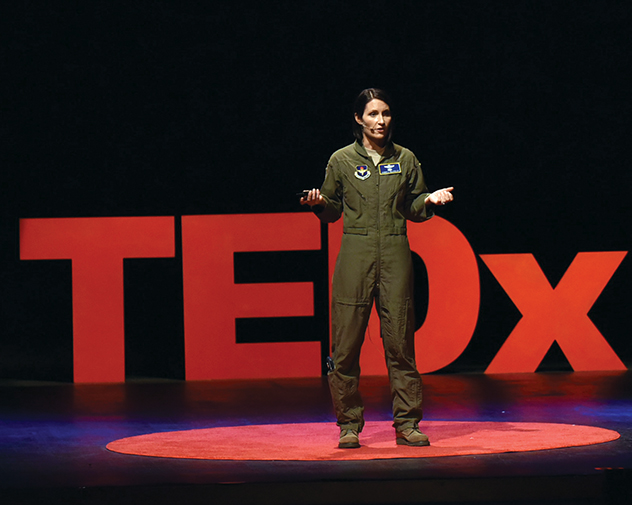
Lt. Col. Jannell MacAulay gave a TEDx Talk on September 9 on the subject of mindfulness and performing well under stress.
The Self-Actualized Soul
According to Abraham Maslow, the leading figure in humanistic psychology, self-actualization is the ultimate goal. Lt. Cols. Jannell MacAulay and Michele Lobianco both subscribe to his Hierarchy of Need and try to create environments for their airmen and staff in which they can achieve self-actualization. Here are some of the most significant characteristics of self-actualized people, according to excerpts from Maslow’s book Motivation and Personality.
- Self-actualized people embrace the unknown and the ambiguous. “The most beautiful thing we can experience is the mysterious.”
- They accept themselves and all their flaws. “One does not complain about water because it is wet, or about rocks because they are hard.”
- They prioritize and enjoy the journey, not just the destination. “They often regard as ends in themselves many experiences and activities that are, for other people, only means.”
- While they are typically unconventional, they do not seek to shock or disturb others or the world around them. “Self-actualized people would usually behave in a conventional fashion simply because no great issues are involved or because they know people will be hurt or embarrassed by any other kind of behavior.”
- They are most motivated by growth, not just by the fulfillment of needs. “Our subjects
no longer strive in the ordinary sense, but rather develop.” - They are grateful. “Self-actualizing people have the wonderful capacity to appreciate again and again, freshly and naïvely, the basic goods of life.”




